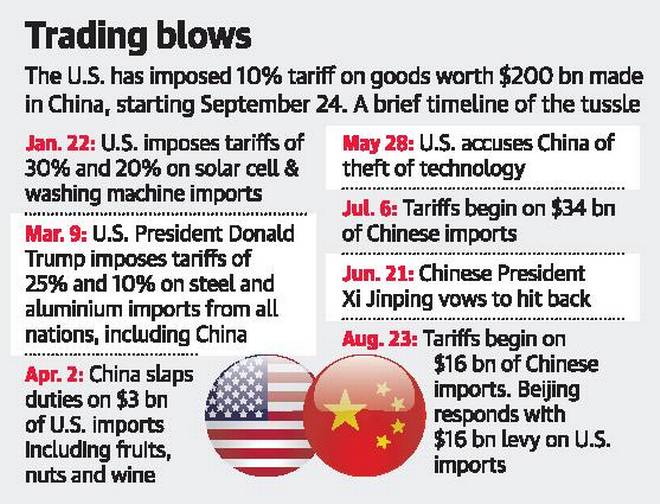The US-China Trade War: Who Conceded First And Why?

Table of Contents
Early Stages of the Trade War and Initial Tariff Impositions
The US-China trade war escalated significantly in 2018, with the Trump administration imposing tariffs on various Chinese goods, citing concerns over intellectual property theft, trade imbalances, and unfair trade practices. These initial actions marked the beginning of a protracted trade conflict.
- US Tariffs: The US initially targeted sectors like steel and aluminum, followed by broader tariffs on hundreds of billions of dollars worth of Chinese goods, including electronics, machinery, and consumer products. These tariffs aimed to pressure China to negotiate more favorable trade deals.
- Chinese Retaliation: China responded swiftly with retaliatory tariffs on US agricultural products (soybeans, corn), automobiles, and other goods, aiming to inflict economic pain on the US and its key industries.
- Economic Impact: The early stages of the trade war led to increased prices for consumers in both countries, disrupted supply chains, and negatively impacted certain industries heavily reliant on trade between the two nations. Estimates of the economic cost varied significantly, but the overall impact was undeniably negative.
- Key Players: Key players during this phase included President Donald Trump and his trade advisors in the US, and Chinese government officials, including Vice Premier Liu He, who led negotiations on behalf of China.
Analyzing Concessions: A Comparative Look at US and Chinese Policies
Determining who "conceded first" is complex. Both sides engaged in a series of actions that could be interpreted as concessions. However, a closer examination reveals a pattern.
- US Concessions: The US eventually agreed to phased tariff reductions on some Chinese goods as part of the "Phase One" trade deal in 2020. This involved reducing existing tariffs and halting further increases. This represented a significant shift from the aggressive tariff strategy employed earlier.
- Chinese Concessions: China committed to significantly increasing its purchases of US agricultural products and other goods. This was a major concession, although the actual fulfillment of these purchase commitments has been subject to debate. China also agreed to address some of the US's concerns related to intellectual property rights, although the effectiveness of these measures remains a point of contention.
- Timing of Concessions: While both sides made concessions, the US arguably made more significant moves first by agreeing to phased tariff reductions. China’s concessions, while substantial, were largely tied to the US’s initial reduction in tariffs.
- Magnitude of Concessions: The magnitude of the concessions is also debatable and dependent on the metrics used. The economic impact of tariff reductions on the US is different compared to China's commitment to increase purchases of US goods, which also involves various factors influencing its success.
The Underlying Reasons for Concessions
The concessions made by both the US and China stemmed from a complex interplay of economic, political, and strategic factors.
- Economic Factors: Both countries faced domestic economic pressures. The US experienced slower economic growth, while China faced challenges related to its economic slowdown and trade-related uncertainty. Specific industries in both countries were heavily impacted and demanded government action.
- Political Factors: In the US, the upcoming 2020 presidential election played a significant role. The economic consequences of the trade war became a significant political issue. In China, maintaining social stability and economic growth were paramount political objectives.
- Strategic Factors: Both countries had long-term economic and geopolitical goals that influenced their decisions. The US sought to reshape the global trade order, while China aimed to maintain its economic growth trajectory and secure its position in the global economy.
The Impact of Concessions on the Global Economy
The concessions made during the US-China trade war had significant global implications.
- Global Supply Chains: The trade war severely disrupted global supply chains, forcing companies to reassess their sourcing strategies and leading to increased costs and uncertainty.
- Inflation and Consumer Prices: Tariffs contributed to increased prices for consumers worldwide, impacting inflation rates and reducing purchasing power.
- Investment Decisions and International Trade: The trade war created uncertainty that negatively impacted investment decisions and international trade flows, slowing down global economic growth.
- Other Countries Impacted: The trade war's impact extended far beyond the US and China, affecting other countries involved in global supply chains and trade relationships.
Conclusion
While both the US and China made concessions during the trade war, the US arguably initiated significant moves first with phased tariff reductions. These concessions were driven by a combination of economic pressures, political considerations, and strategic goals. The trade war's impact extended far beyond the two nations, disrupting global supply chains and impacting consumer prices and investment decisions. Understanding the complexities of this conflict requires consideration of numerous factors and ongoing analysis of its lasting effects. To further understand the nuances of the US-China Trade War and its ongoing effects, explore related resources and continue the conversation.

Featured Posts
-
 Chandler And Pimbletts Bold Ufc 314 Predictions Exclusive Interview
May 15, 2025
Chandler And Pimbletts Bold Ufc 314 Predictions Exclusive Interview
May 15, 2025 -
 The Butler Effect How The Warriors Appeal Impacts Miami Heat Recruitment
May 15, 2025
The Butler Effect How The Warriors Appeal Impacts Miami Heat Recruitment
May 15, 2025 -
 Can The Padres Finally Beat The Rockies
May 15, 2025
Can The Padres Finally Beat The Rockies
May 15, 2025 -
 How Ind As 117 Is Restructuring Indias Insurance Landscape
May 15, 2025
How Ind As 117 Is Restructuring Indias Insurance Landscape
May 15, 2025 -
 Arcade Mode Returns In Nhl 25 This Week
May 15, 2025
Arcade Mode Returns In Nhl 25 This Week
May 15, 2025
